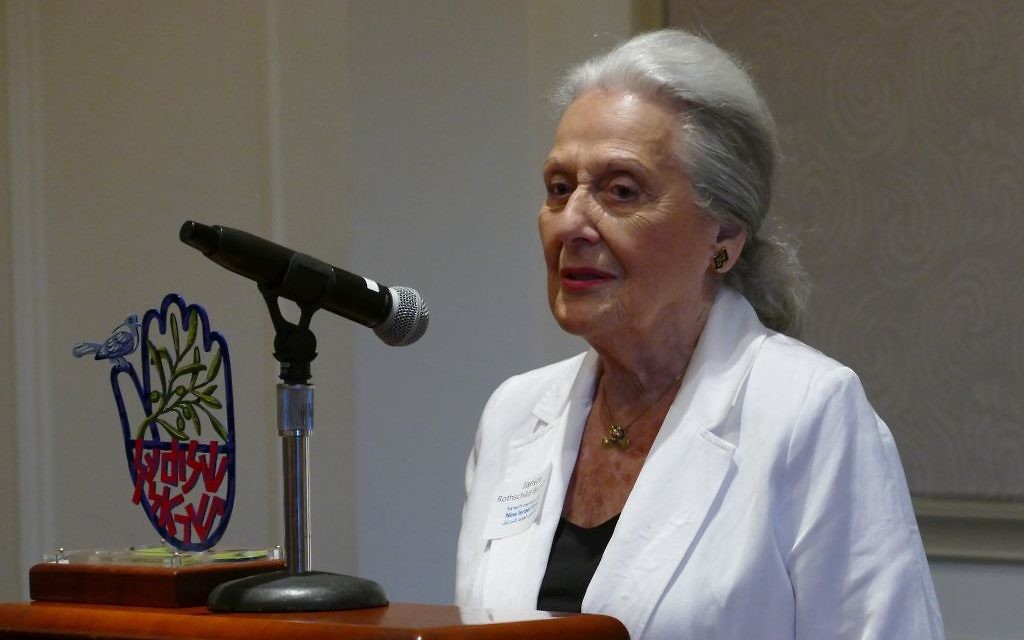NIF Honors History-Making Temple Matriarch
Janice Rothschild Blumberg was presented the NIF Atlanta Tzedek Award on May 25.

Janice Rothschild Blumberg likes to tell a story about her friend Ilse Yallon, a fervent Zionist whose family made aliyah in the 1930s and whose husband, Shimon, was one of the first Israeli consuls general in Atlanta.
In the euphoria after the Six-Day War, Rabbi Jacob and Janice Rothschild led a group from The Temple to visit Israel in January 1968, and the Yallons took them to their favorite restaurant for lunch — in Ramallah, now the seat of government for the Palestinian Authority.
Among Ilse Yallon’s boasts about what made Israel great was the lack of Black Panthers in the Jewish state.
Get The AJT Newsletter by email and never miss our top stories Free Sign Up
Six months later, the Rothschilds were driving from Jerusalem to Caesarea and gave a ride to some soldiers whose parents had immigrated to Israel from Arab countries. Sure enough, during the drive, the soldiers declared themselves to be Black Panthers — not violent or militant, but determined to gain the same government protections and services as Ashkenazi Jews.
Blumberg told about the Israeli Black Panthers while accepting the first New Israel Fund Atlanta Tzedek Award at The Temple on Thursday night, May 25. She pointed out the parallels between Israel and the United States in how their treatment of minorities often falls short of the countries’ ideals.

“Golda’s dream came true to some extent. Israel is becoming a nation like any other nation in many ways, but it will never be a nation like all other nations in all ways. And I wonder how much of this unrealistic Zionist idealism is still there,” Blumberg said.
She said the organizations NIF supports are responsible for the surviving idealism. With NIF’s help, nonprofit groups dedicated to equality and a civil society in Israel are “pushing a huge boulder uphill constantly, and it’s up to us to do what we can to help them keep that boulder going up and not falling back.”
Rabbi Peter Berg, who had a conflict and missed the event, had a statement read in which he said he was proud to host the 70 or so attendees at the ceremony in part because Blumberg is his hero and friend and the matriarch of The Temple, where she has been a member all her life.
“Janice has been a witness to history and a participant in making notable history. She has been a celebrity and has been with celebrities,” Lois Frank said in her introduction of the honoree. “But it’s her character and her soul by which we most profoundly know her.”
Appropriately a few days before Shavuot, when the Book of Ruth is read, Rabbi Berg said that, as Ruth followed Naomi, so people want to go where Blumberg goes and live as she lives, and that includes support for NIF. “The values of NIF course through her blood with all that she is and all that she does.”
Rabbi Berg said NIF means the world to him because no organization does more in Israel for civil rights, democracy, pluralism and religious tolerance and almost no other Israeli group is concerned about economic justice.
NIF, which has become active in Atlanta the past two years, is controversial because it funds groups, such as Breaking the Silence, that criticize the Israeli government and the Israel Defense Forces on the international stage.
“Janice didn’t ask for agreement, only civility,” Frank said. “ ‘It never bothered me’ — this is a quote from Janice — ‘to have people critical of me. I was in theater and orchestra. I’m used to taking direction and critique.’ ”
Her theater roots give her a different perspective on this period of major anniversaries. While she said she joins in celebrating the 150th birthday of The Temple and 50 years of a reunified Jerusalem, she also is excited about the centennial of Israel’s Habima Theatre.
“I celebrate it because I feel that the arts and theater especially serve as the last bastion of free speech, which we are in dire need of today both in Israel and America,” Blumberg said.
She’s less enthusiastic about the 50th anniversary of the Six-Day War. “I think back on those days 50 years ago with great nostalgia, with great love and with a certain amount of sadness, disappointment, that the euphoria that all of us felt then is no longer there, and there’s just so much of the news that comes out now that makes us wonder if there will ever be a time like that.”
Blumberg, who first traveled to Israel in 1963 and has visited many times since, said she got involved with NIF in the mid-1990s because of the organization’s support for civil rights.
It was therefore fitting that the guest speaker at the ceremony was Sharon Abraham-Weiss, the executive director of the Association for Civil Rights in Israel. Shai Robkin, who heads NIF’s Atlanta Regional Council, called Israel’s oldest and largest civil rights organization the flagship grantee for NIF.
Some of the cases Abraham-Weiss talked about, such as the 1995 lawsuit that forced the IDF to let women serve as combat pilots, have developed into issues about which Israel boasts (such as the meme about Israel having more female military pilots than Saudi Arabia has female drivers).
Abraham-Weiss said much of what ACRI does involves identifying an important civil rights issue, then helping shift public opinion to embrace it. She said taking a case to Israel’s Supreme Court is a last resort, although “we’ve gotten there too many times.”




comments